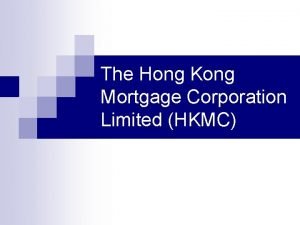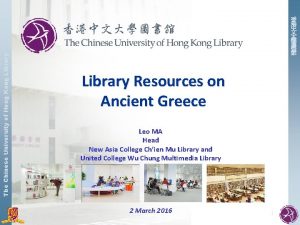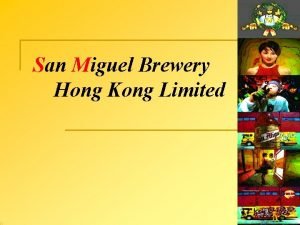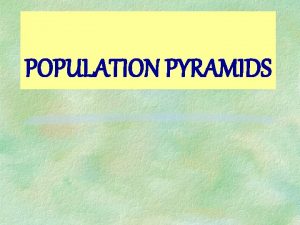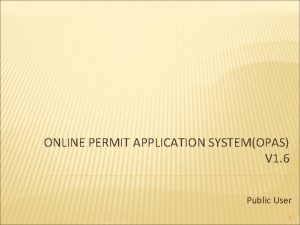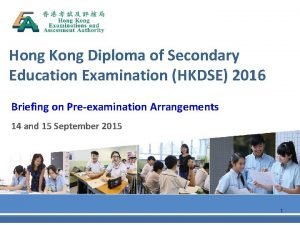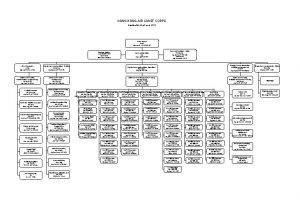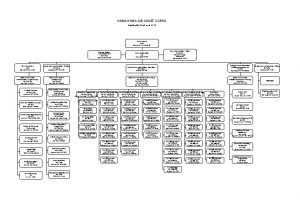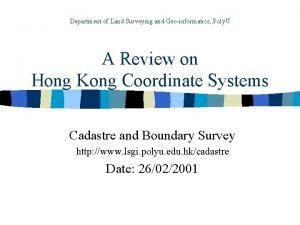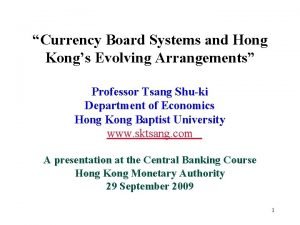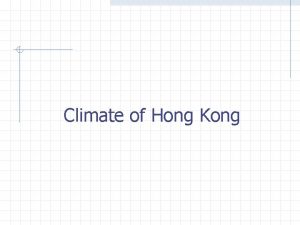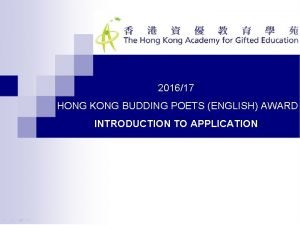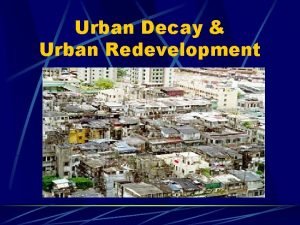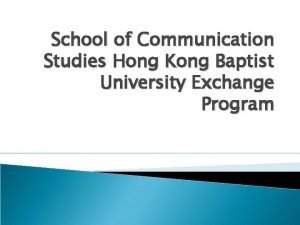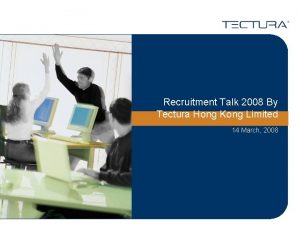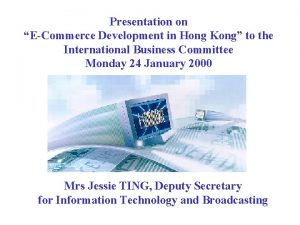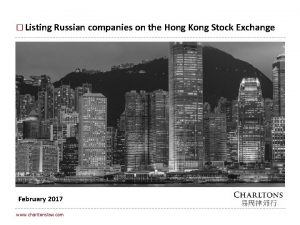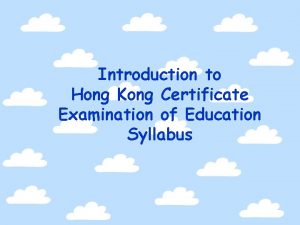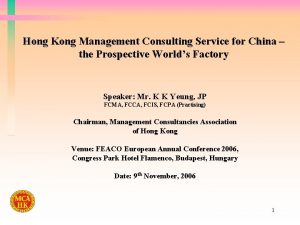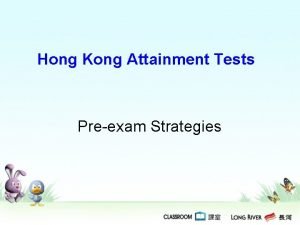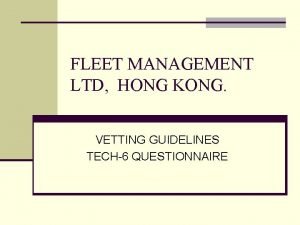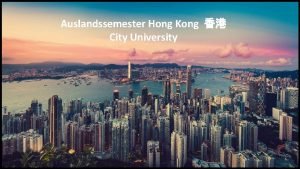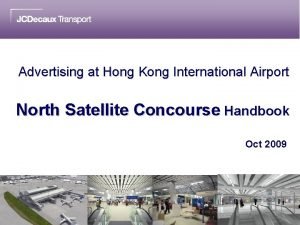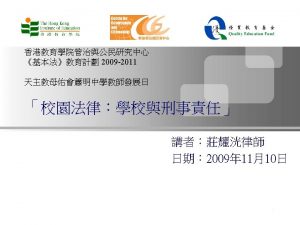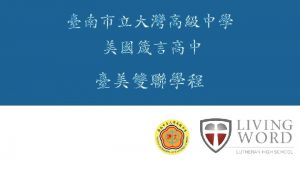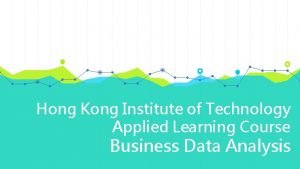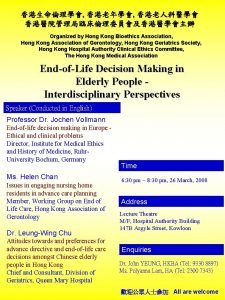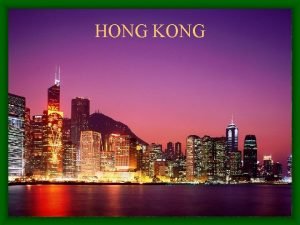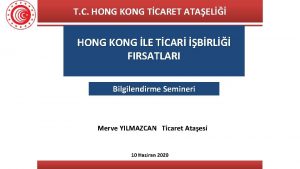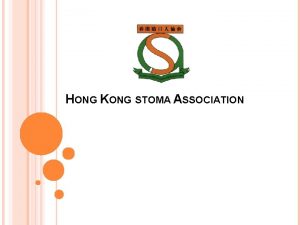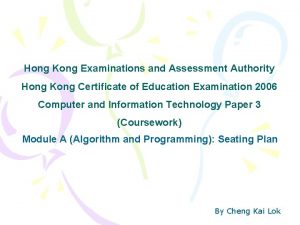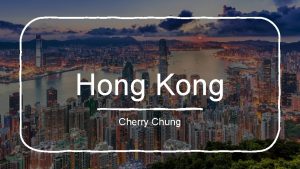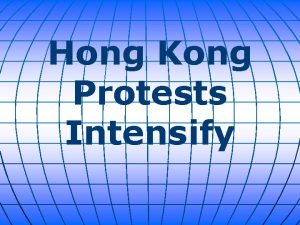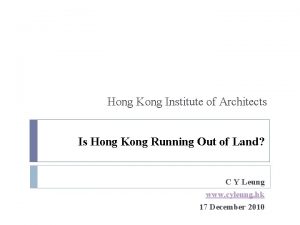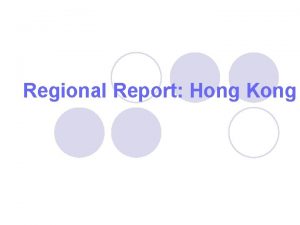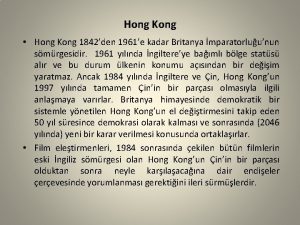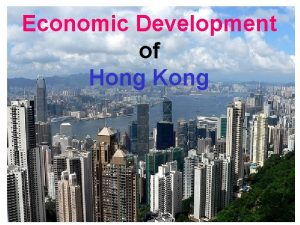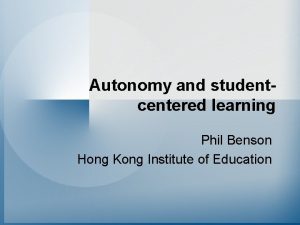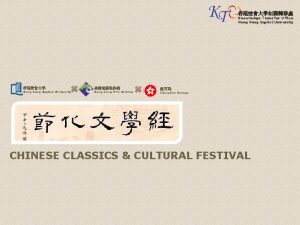THE HONG KONG AUTONOMY ACT JULY 30 2020






























- Slides: 30

THE HONG KONG AUTONOMY ACT JULY 30, 2020 Peter Reisman - Co-Chair of the CGCC Government and Public Relations Committee; Managing Director and Chief Communications Officer at Bank of China USA Lanier Saperstein - Jones Day Doyle Bartlett – Gray. Robinson Lisa Ledbetter - Jones Day Grayson Yeargin - Jones Day

INTRODUCTION Lanier Saperstein (Partner, Jones Day) Lanier Saperstein represents Chinese financial institutions and corporations in U. S. litigation and regulatory matters. He has been recognized by leading legal publications, including the Washington Post and the National Law Journal, for his work in international banking and for his in-depth knowledge of the U. S. and Chinese financial markets. 2

DISCLAIMER The views set forth herein are the personal views of the authors, they do not necessarily reflect the views of the CGCC – USA, Bank of China USA, or Jones Day. This presentation should not be considered or construed as legal advice on any individual matter or circumstance. The distribution of this presentation or its content is not intended to create, and receipt of it does not constitute, an attorney-client relationship. The contents of this document are intended for general information purposes only and may not be quoted or referred to in any other presentation, publication or proceeding without the prior written consent of the CGCC – USA, Bank of China USA, Jones Day and the authors. 3

PRELIMINARIES We are recording the webinar and will make the recording and PPT slides available afterwards Please feel free to ask questions during the webinar or during the Q&A session by clicking on the “Q&A” tab 4

AGENDA • Backdrop and the Poll Results • Current Political Environment: Temporary or Fundamental Shift? • The Structure of the Hong Kong Autonomy Act (“HKAA”) • Comparison with Other Sanctions Regimes • President Trump’s Executive Order 13936 • Implementation / Practical Considerations • Q&A 5

MODERATOR Peter J. Reisman (Co-Chair of the CGCC Government and Public Relations Committee, Managing Director at Bank of China USA) Mr. Reisman joined BOC USA in 2017 and leads a new group focusing on government and public relations, business development, marketing, and corporate social responsibility. Mr. Reisman has almost 30 years of experience working with Chinese private and government entities advising on cross-border investments and bilateral trade negotiations with the United States, China and Israel. Mr. Reisman received a Masters in Law from Peking University Law School, a Juris Doctor Degree and LL. M. from Columbia Law School and spent six years in Israel working for the government in both a legal and advisory capacity focusing on issues relating to China and other countries in the Asia Pacific region. Mr. Reisman is fluent in Mandarin and Hebrew, and he serves as Co-Chair of the Government and Public Relations Committee for the China General Chamber of Commerce- U. S. A. 6

THE BACKDROP 7

WHAT IS THE BIGGEST SINGLE REASON FOR THE CURRENT STATE OF US. -CHINA RELATIONS: Sales 2% Disputes over trade policies 14% China getting stronger 16% 50% Capitalism vs. socialism with Chinese characters US presidential cycle 18% Covid-19 outbreak 8

OVER THE NEXT 12 MONTHS, DO YOU THINK CHINA-US RELATIONS WILL: Sales 20% 55% Improve Stay the same 25% Worsen 9

WHAT LEVEL OF INFORMATION DO YOU HAVE ABOUT THE HONG KONG AUTONOMY ACT? Sales I have been monitoring it closely, reading relevant news items on a regular basis 16% 29% I have a general understanding of the HKAA, but I have not followed it closely 55% I have not followed the HKAA until now, but my colleagues recommend I join because it is relevant to our business 10

DO YOU EXPECT THE HKAA TO IMPACT YOUR BUSINESS? Sales 18% 25% Yes, a lot Yes, but only marginally 57% No 11

BACKGROUND • Polls by Reuters showed that support for HK protests had dropped from 58% to 51% from March to June. For the same time period, opposition to the protests had risen from 28% to 34%. • While U. S. businesses in HK are concerned about China’s new National Security Law, the majority of them -- 64% -- say they have no plans to move out of Hong Kong. • But in the U. S. , the view has been overwhelmingly negative, and Congress moved swiftly and unanimously in response…. 12

SPEAKER Doyle Bartlett (Managing Shareholder, Gray. Robinson) Doyle leads Gray. Robinson’s federal lobbying arm. Doyle has considerable government experience. He served for five years as Chief of Staff to Representative Bill Mc. Collum, supporting Congressman Mc. Collum's work as Vice Chairman of the House Banking Committee and Chairman of the House Judiciary Committee's Crime Subcommittee. He oversaw Bill Mc. Collum's race for the U. S. Senate in 1999 -2000 and his successful campaign for Florida Attorney General in 2006. Doyle was General Counsel and Senior Vice President for Legislative Services with the Conference of State Bank Supervisors, the professional association of state banking regulators. Before then, Doyle was Manager of State Government Relations at Freddie Mac. 13

TIMELINE May 28, 2020 President’s Announcement that U. S. would revoke HK’s special treatment July 14, 2020 President signed into law the HKAA and issued Executive Order 13936 June 30, 2020 China Passed National Security Law for Hong Kong July 2, 2020 Senate Passed the HKAA Unanimously July 1, 2020 House Hearing House Passed the HKAA Unanimously 14

THE POLITICAL ENVIRONMENT • The view from the Hill and 1600 Pennsylvania Avenue • In our poll, 50% of the respondents believe that the US presidential election cycle is the single biggest reason for the current state of US-China relations. What impact, if any, will the presidential election have on the HKAA? • Is this the new normal? i 15

SPEAKERS Grayson Yeargin (Partner, Jones Day) Grayson Yeargin’s practice involves representing and advising clients concerning economic sanctions and export controls. He has extensive experience assisting financial institutions and companies with compliance with the sanctions and embargoes administered by the Office of Foreign Assets Controls (OFAC), the International Traffic in Arms Regulations (ITAR), the Export Administration Regulations (EAR), and anti-boycott laws. He also assists clients with other aspects of international compliance including issues involving the Foreign Corrupt Practices Act (FCPA), the Foreign Agents Registration Act (FARA), transactions involving the Committee on Foreign Investment in the United States (CFIUS), and determinations concerning Foreign Ownership, Control, and Influence (FOCI), among others. Lisa M. Ledbetter (Partner, Jones Day) Lisa Ledbetter advises financial institutions in navigating complex regulatory, transactional, and enforcement challenges. Prior to Jones Day, Lisa was deputy general counsel at Freddie Mac and deputy office director at the FDIC. She previously served as banking and finance counsel at the Department of the Treasury during the George H. W. Bush administration and as regulatory counsel for the American Bankers Association and Independent Community Bankers Association representing the interests of small, regional, and large banks. 16

THE HKAA’S STRUCTURE Two lists in the form of Executive Branch reports to Congress The State Department’s report to Congress on an annual basis: 1) identifying any non-U. S. individuals and entities that are materially contributing to, have materially contributed to, or attempt to materially contribute to “the failure of the Government of China to meet its obligations under the Joint Declaration or the Basic Law”; and The Treasury Department’s report to Congress on an annual basis: identifying any foreign financial institution that “knowingly” conducts a “significant transaction” with a person or entity identified in the State Department report. (See § 5(b) of the HKAA. ) 2) describing the activity on which such identification is based. (See § 5(a) of the HKAA. ) 17

SANCTIONS Foreign Persons: Foreign Financial Institutions: • In general • The President must impose at least five of 10 enumerated sanctions on any foreign financial institution named in the Treasury Department report no later than one year following that institution’s inclusion in the report. • The President must impose all 10 of the enumerated sanctions if the institution is included in the report two years in a row. • Authorizes the President to impose propertyblocking sanctions on an individual or entity named in a report, and visa-blocking sanctions on a named individual as soon as that person is identified. • Mandatory sanctions • Requires the President to impose of sanctions no later than one year after such person’s inclusion in the report. See § 6(a) of the HKAA. See § 7(a) of the HKAA. 18

CRITERIA • For identified foreign persons, the criteria for “material contribution” are discretionary and fact-specific. • A foreign financial institution is to be added to the second list if it “knowingly” conducts a “significant transaction” with a person or entity identified on the first list. o “Knowingly” is defined in the Act as “with respect to conduct, a circumstances or a result, ” that “a person has actual knowledge of the conduct, the circumstances or the result. ” (See § 2(9) of the HKAA. ) o The Act does not define the term “significant transaction. ” However, the term is used in other contexts, such as OFAC in connection with other sanctions programs. 19

WAIVER AND TERMINATION • The President may exclude a person or entity from a list in certain instances, or waive or terminate the imposition of sanctions with respect to a person or entity identified in either list. • Congress may override such a waiver or termination by passing a joint resolution of disapproval. (See § 2(9) of the HKAA. ) • The President has noted his objection to these conditions on constitutional grounds, and indicated that his Administration will treat them as advisory and non-binding. 20

COMPARISON WITH OTHER SANCTIONS REGIME • Traditional/ standard sanctions regimes • Secondary sanctions on financial institutions • Countering America's Adversaries Through Sanctions Act (“CAATSA”) and sanctions on Iran, North Korea, and Russia • Sanctions regimes in parallel with the HKAA 21

THE HONG KONG EXECUTIVE ORDER • The President issued Executive Order 13936, “Hong Kong Normalization, ” (“HK EO”) on the same day he signed the HKAA. • It (1) addresses HK’s status; and (2) authorizes the imposition of sanctions. • The HK EO implements the HKAA, but it also provides additional designation criteria beyond those enumerated in the HKAA. • It grants either the Secretary of State or the Secretary of the Treasury (in consultation with the other) the power to designate for blocking sanctions, effectively immediately, any non-U. S. person they determine to: 22

THE HONG KONG EXECUTIVE ORDER (CONTINUED) o to be involved in the “coercing, arresting, detaining, or imprisoning of individuals under the authority of, or to be or have been responsible for or involved in developing, adopting, or implementing” the National Security Law o to be responsible for or to have engaged in a range of activities, including actions that “undermine democratic processes”; “threaten the peace, security, stability, or autonomy”; “prohibit, limit, or penalize the exercise of freedom of expression”; or violate “internationally recognized human rights”; and o to be a leader or official of an entity that has engaged in the above activities; materially assisted or provided financial support or in some other way acted for or at the direction of any sanctioned entity. 23

PRACTICAL CONSIDERATIONS • Timing: o When can we expect State to issue its first report to Congress? And what about the Treasury report? o What should we expect to see in those reports? o Unlike the HKAA, the HK EO takes effect immediately. Can we expect the President to place persons or entities on the Specially Designated Nationals And Blocked Persons List (SDN) before State and Treasury issue their reports? • What we can glean from what from the existing sanctions programs, such as CAATSA, to help here? 24

PRACTICAL CONSIDERATIONS (CONTINUED) • What can companies and financial institutions do now, if anything, to deal with what is coming: o Conduct audits? o De-risk by off boarding politically exposed persons (PEPs)? o Terminate other customer relationships? o Sit and wait? • If a person or entity is added to a list, do they have any recourse? Can they sue OFAC? Has any person or entity had any success suing OFAC or other branches / agencies of the US government? 25

PRACTICAL CONSIDERATIONS (CONTINUED) Ø What should a company or financial institutions do if it is caught between HK and US law? Ø Whose law do they follow? 26

QUESTIONS? 27

WHAT WOULD YOU LIKE THE CGCC TO COVER NEXT: Sales 2% More on sanctions 20% 22% 19% Trade relations How to navigate the current hostile environment in the US Business opportunities in the US 38% Other 28

Upcoming CGCC Events August 5 th CGCC’s “Experience 2020” Photo Contest Begins August 12 th Perspectives on the U. S. -China Bilateral Dynamic and Its Impact on Business, Trade & Investment:CGCC – USA 2020 Annual Business Survey Report Launch August 20 th Digital Transformation Trends in Healthcare: The Positive Impact of COVID-19

CGCC’s U. S. -China Legal and Policy Resource Center Scan the QR below to learn more • Commentary, Articles, Reports, Analysis on U. SChina legal topics/policies • Resources span a variety of topics including (but not limited to) Cross-Border Transactions, Immigration & Visa Related, Anti-Corruption & Compliance, Labor, Anti- Discrimination, Policy
 The hong kong mortgage corporation limited
The hong kong mortgage corporation limited Hong kong institute of chartered secretaries
Hong kong institute of chartered secretaries Chinese university of hong kong library
Chinese university of hong kong library Strength of san miguel
Strength of san miguel Beehive population pyramid
Beehive population pyramid Extranetapps hongkongairport com
Extranetapps hongkongairport com Hkdse full name
Hkdse full name Hong kong air cadet corps
Hong kong air cadet corps Hong kong air cadet corps
Hong kong air cadet corps Polyu surveying
Polyu surveying Currency board hong kong
Currency board hong kong Wind speed symbol hong kong
Wind speed symbol hong kong Bloomberg academy hong kong
Bloomberg academy hong kong Gyeongu
Gyeongu Hong kong budding poets (english) award online platform
Hong kong budding poets (english) award online platform Urban decay problem in hong kong
Urban decay problem in hong kong Hkbu communication studies
Hkbu communication studies Tectura hong kong
Tectura hong kong Ecommerce development hong kong
Ecommerce development hong kong Russian companies listed in hong kong
Russian companies listed in hong kong Hong kong certificate of education examination
Hong kong certificate of education examination Management consulting hong kong
Management consulting hong kong Hong kong chemistry olympiad
Hong kong chemistry olympiad Attainment test examples
Attainment test examples Fleet management hong kong
Fleet management hong kong Auslandssemester hong kong
Auslandssemester hong kong Hong kong international departures
Hong kong international departures The boys’ & girls’ club association of hong kong
The boys’ & girls’ club association of hong kong Concordia international school hk
Concordia international school hk Hong kong institute of technology
Hong kong institute of technology Hong kong dietary guidelines
Hong kong dietary guidelines
